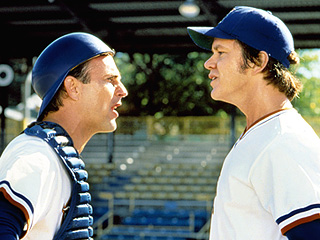We’re headed for another Midwestern winter, and it’s time for yet another edition of the reading list! Even though the baseball season has been done for a week or so, I included a couple of (final?) baseball books. Along with it, we’ve got some politics and sci-fi.
Enjoy! And let me know what you’ve been reading lately.
Jim Bouton – Ball Four
Originally I didn’t plan to include any baseball books on this list. But the World Series does stretch into November, right? Right.
Bouton’s book is a diary of a season by a middle of the road pitcher. And it was highly controversial at the time. While it made a splash in 1970, the basic approach here – pointing out the problems with baseball management and ownership, chronicling the ways players talk in the locker room – became pretty much the norm not long after the book. Aside from a few cringeworthy moments, Bouton delivers a solid book.
Ron Shelton – The Church of Baseball
Shelton wrote and directed the film Bull Durham. 30+ years later, he decided to write a book on the making of the film. He walks the reader through the script, the casting, the filming, and the constant little battles with the production company that brought the movie to the screen.
I guess it’s a strange idea for a book, especially more than three decades later. But I enjoyed it. Shelton tells his story well. And he usefully draws on his own background as a minor league baseball player. And so, I learned a bit about both filmmaking and minor league baseball!
Olúfẹ́mi O. Táíwò – Elite Capture; Touré Reed – Toward Freedom
Táíwò and Reed both criticize what I call ‘identitarianism‘ from a leftist perspective. They wrote their books around the same time, and I read the books at the same time. In some sense, I tried to put them in dialogue with one another.
It’s not a perfect approach, since the two authors diverge a bit. I find in Táíwò a keener sense of what people find appealing about these problematic forms of identity politics. He analyzes in detail how elites co-op those politics for their own ends. But I suspect there’s far more to it than this, and I might have more to say on Táíwò in a future post.
Reed, on the other hand, focuses on what’s lost when people go too far down the identitarian road. He shows how universal programs are much better at building broad coalitions and benefiting the very marginalized people their critics say they want to benefit.
Adrian Tchaikovsky – Eyes of the Void
Readers might recall that I included the first book in Tchaikovsky’s Final Architecture trilogy in the September post. This is the second book!
This book continues the story right from where the first one left off – a multi-species alliance is locked into a long-term war with the Architects, a moon-sized alien force that destroys inhabited planets. This book complicates the plot, as we discover that the Architects might not be as in control as we thought. On the whole, this book develops the plot well and moves the story with more action than the first.
Craig Whitlock – The Afghanistan Papers
Whitlock provides us with a history of the U.S. war in Afghanistan. Who did we fight in Afghanistan? Well…that’s one of the problems Whitlock tackles. As he tells the story, no one really understood the mission. From the Bush Administration to Obama to Trump, the U.S. never really figured out whether it was fighting al-Qaeda or the Taliban, whether it wanted to deter terrorist attacks or remake Afghan society, and what markers it might use to determine success.
Within this clearly mainstream set of assumptions and standards, Whitlock largely succeeds. He shows many of the internal problems with the U.S. war. Does Whitlock go beyond that, and get at the real causes of the war? Does he get at leftist critiques of U.S. foreign policy and its operations? No. But, of course, that was never his goal in the first place.
